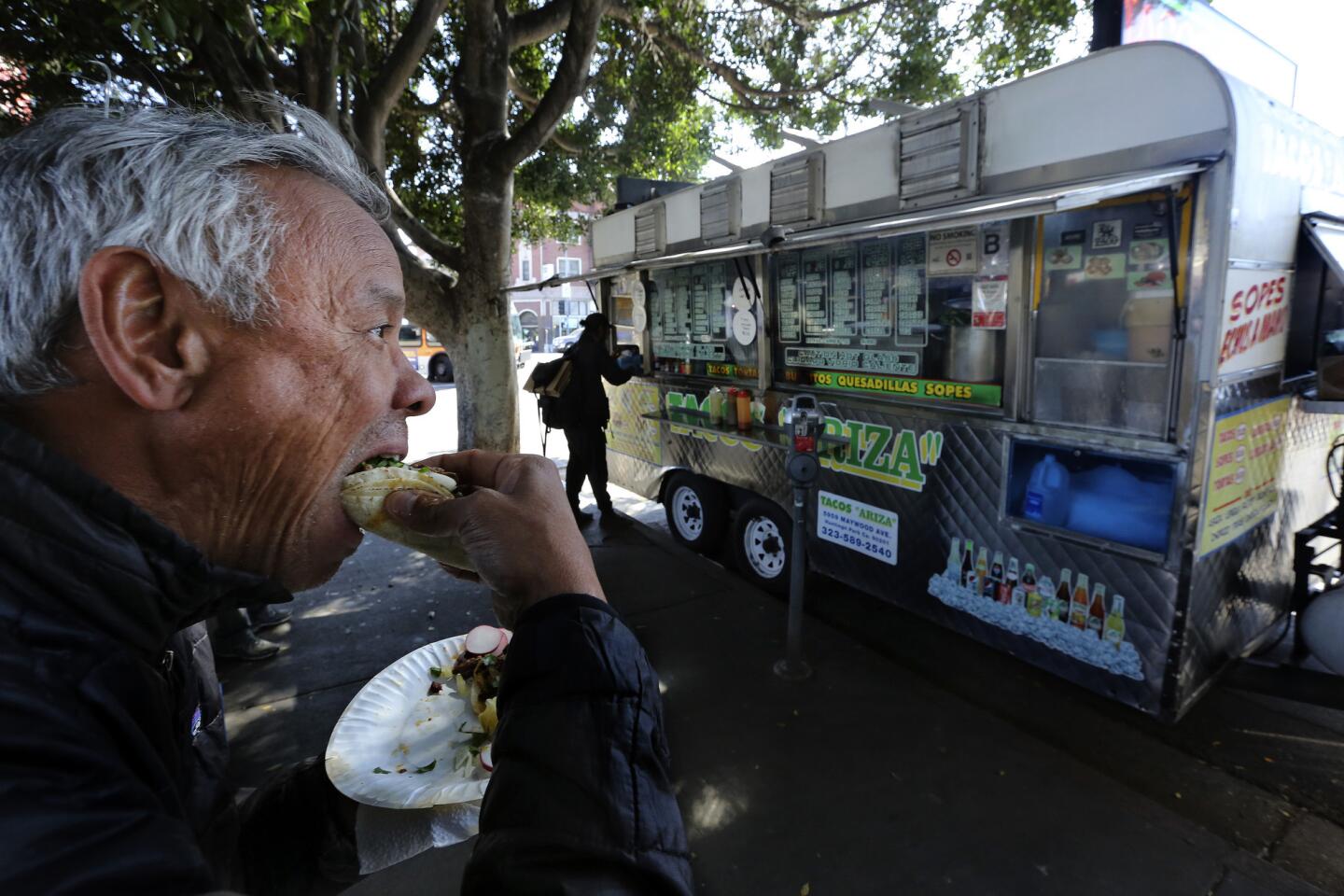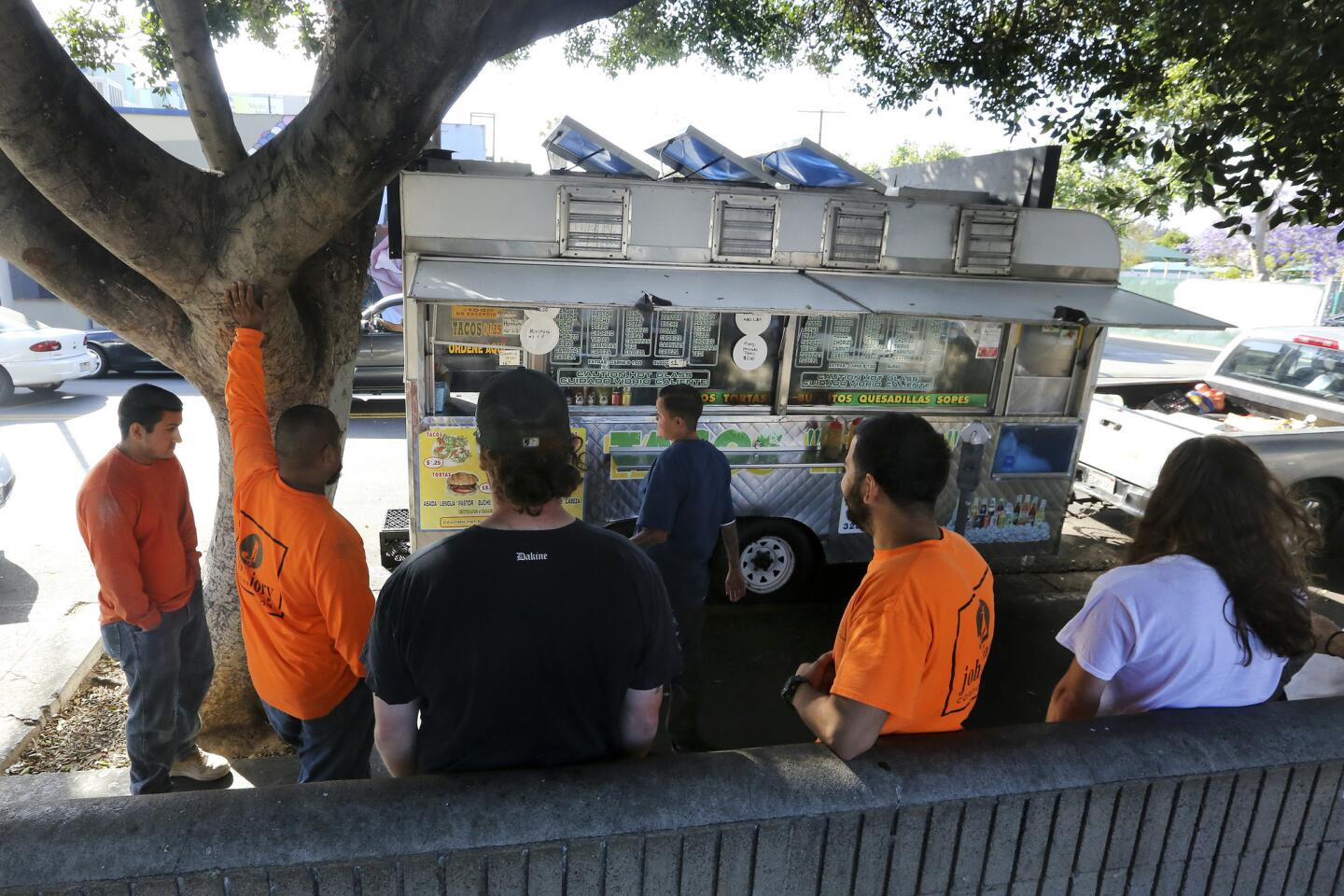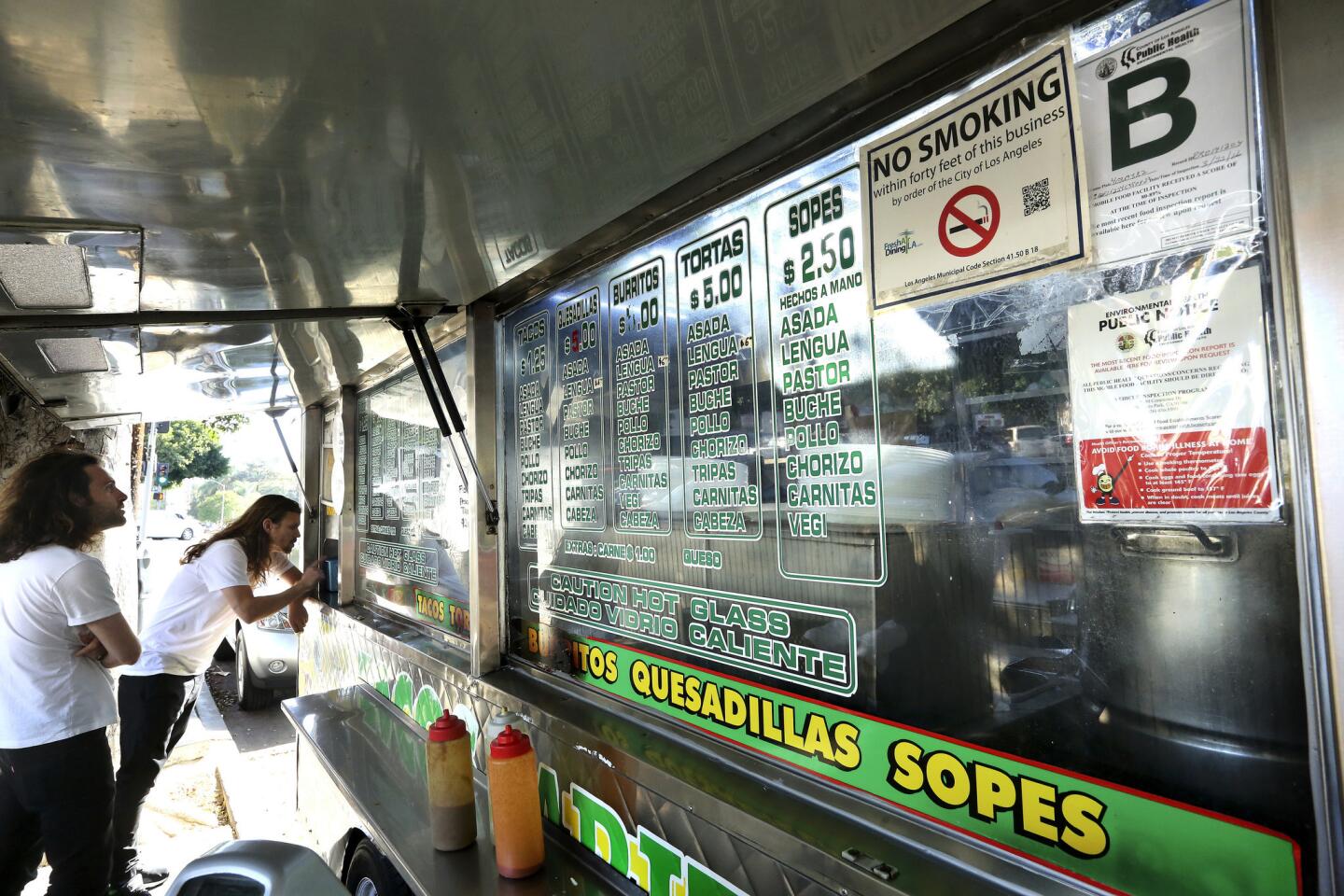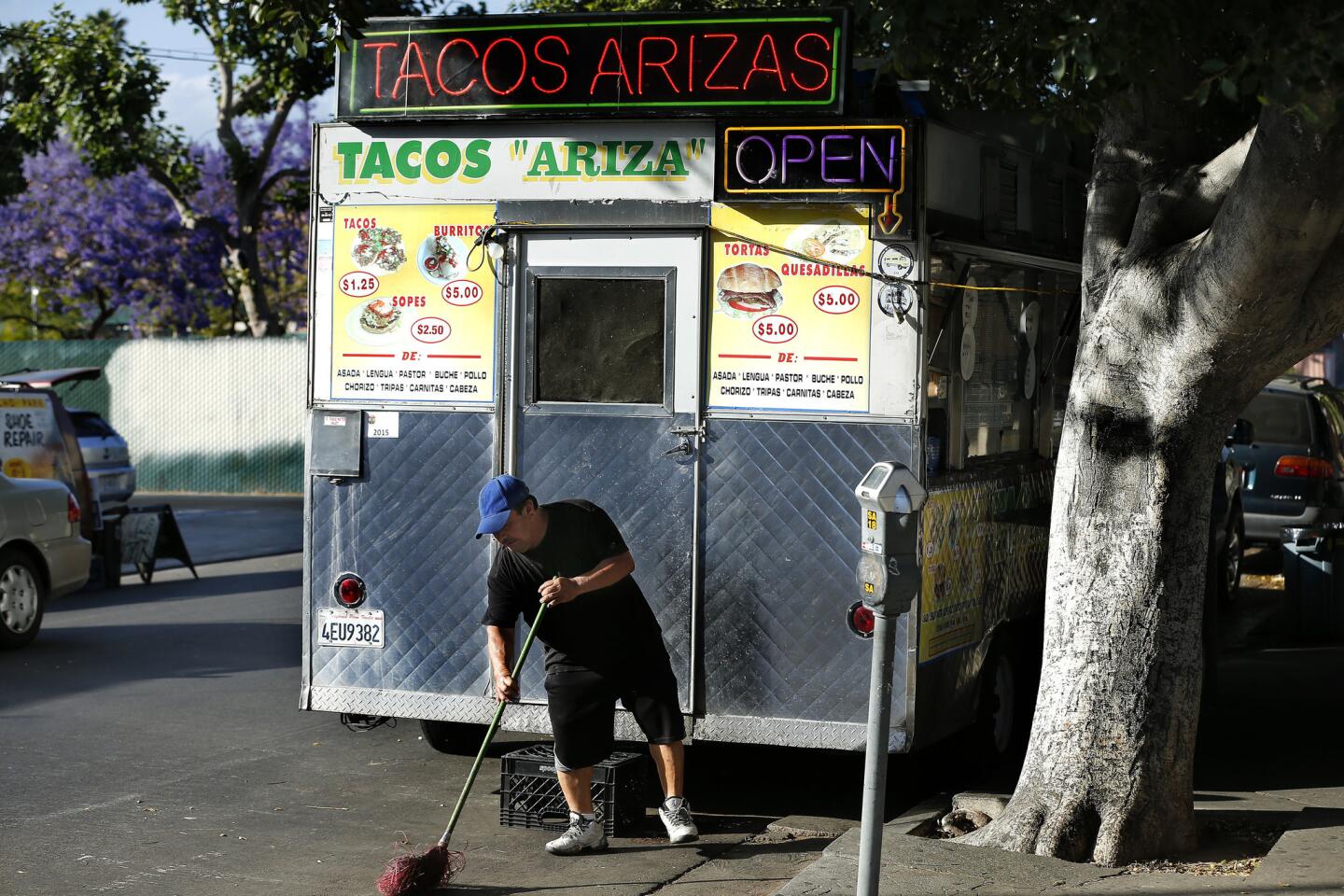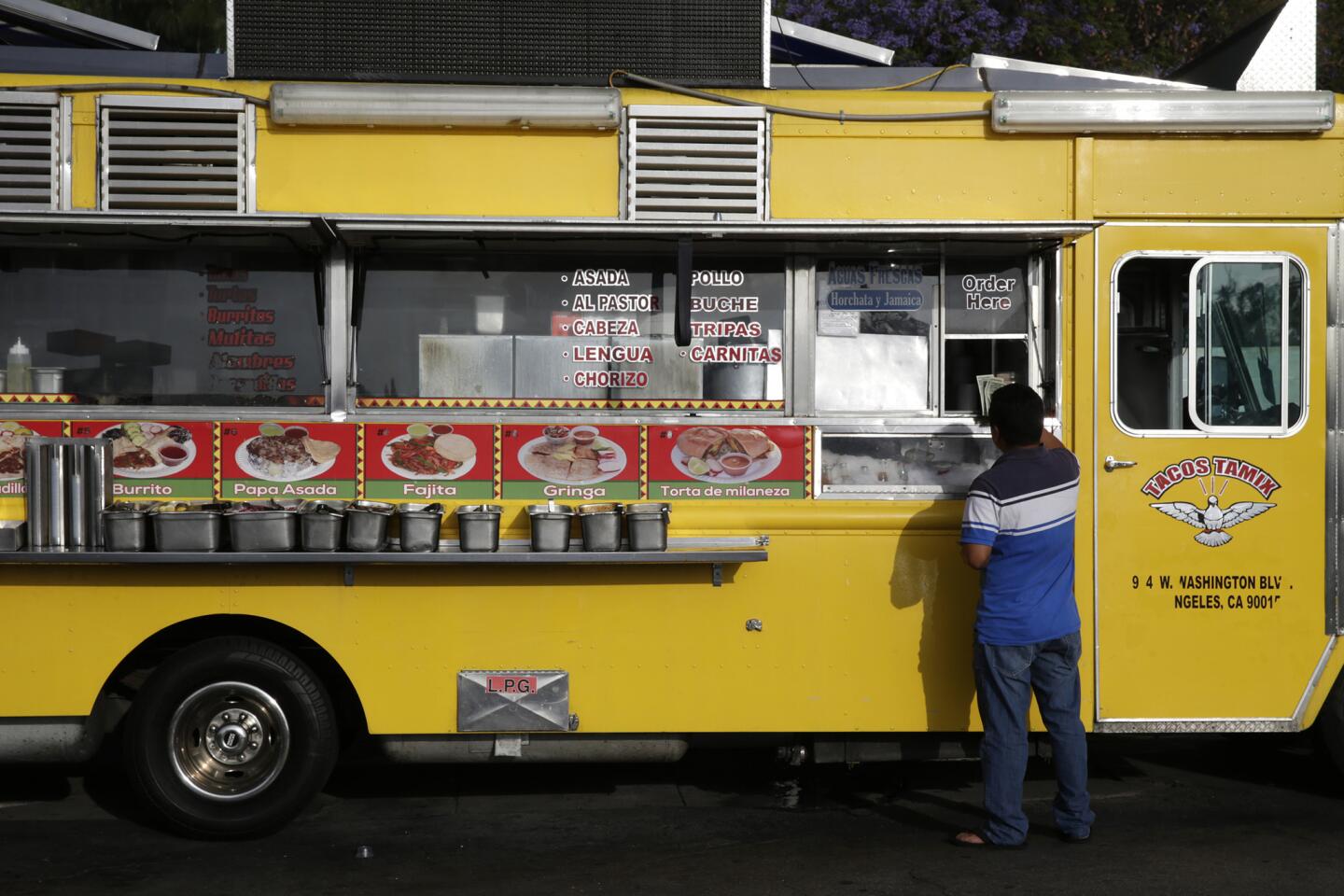The dark side of trendy food trucks: A poor health safety record
- Share via
It’s a daily culinary performance that plays out across Los Angeles: Top food truck chefs whipping up gourmet meals in spaces no bigger than a restaurant’s stockroom or walk-in freezer.
But even as the trucks have become a popular staple of the local food scene, with Twitter followers and long queues, they have been lagging behind restaurants and even sidewalk food carts in one important category -- health safety, a Times data analysis found.
About 27% of food trucks earned lower than A grades over the last two years, according to a Times review of Los Angeles County Department of Public Health data. By comparison, slightly less than 5% of brick-and-mortar restaurants and about 18% of food carts fell below that mark.
More than 4% of food trucks inspected this year were forced to close -- a rate three times higher than regular restaurants, the analysis shows. The health department has closed more than 70 food trucks this year, most of which were allowed to reopen after passing follow-up inspections.
Experts say food trucks face unique challenges to stay sanitary. Workers must do their jobs in confined spaces -- typically less than 8 feet wide by 20 feet long -- and trucks often lack the equipment of a full-sized restaurant.
That can lead to more cross-contamination, USC accounting professor Ruben Davila said.
“If I serve you and I also prepare the food, there’s a little bit of a problem right there with health issues, potentially,” said Davila, academic director of the Food Industry Management Program at USC.
Storage temperature is also more difficult in mobile cooking, so it must to be closely scrutinized to make sure ingredients don’t spoil, he said.
Truck owners must also deal with the elements that come with being on the street rather than inside a building.
The Hungry Lion food truck at Loyola Marymount University was shut down April 6 after inspectors found a rodent infestation.
Mice had crawled into the truck through the engine manifold when it was not in service, said Dana Massimiani, director of operations for Loyola’s food service contractor Sodexo.
After inspectors found more than nine rodent droppings, the vehicle was sent back to the manufacturer to fix the issue, he said. The truck reopened two days later and received an A on its next inspection, records show.
More than 4% of food trucks received C grades, compared with fewer than 1% of restaurants, the analysis of health department data since May 2014 found. Inspectors visited more than 36,000 food sellers during that time.
Tacos Ariza, an Echo Park fixture at Sunset Boulevard and Logan Street, earned a C on a health inspection in early March.
Health inspectors noted 16 violations, including three major infractions after they found employees failed to wash their hands or use gloves properly, and did not keep food surfaces clean or food “safe and unadulterated.”
Employee Isabel Ariza said business was down after the blue C was posted in the window, but has improved since a reinspection in late March earned the food truck a B grade.
We try our best to be prepared but [inspectors] always try to find something. It’s hard to get an A grade.
— Isabel Ariza
Ariza said she and other workers strive to follow health regulations, but it’s a constant struggle. The food preparation area and refrigerator are both small, which can lead to violations, she said.
“It’s not as simple as it seems,” Ariza said. “It’s hard to keep everything in one compact space. They really expect a lot from us. We try our best to be prepared but [inspectors] always try to find something. It’s hard to get an A grade.”
The health department began inspecting food trucks in 2011. A Times report in 2014 found that inspectors reviewed only 40% of trucks and mobile food carts because of short-staffing and difficulty in locating the trucks when they were in operation.
James Dragan, the county’s chief environmental health specialist for consultative services, agreed that a tighter work space could lead to more violations but stressed that his department has not yet studied its inspection data.
Inspectors now require trucks to submit route slips and have checked about 70% of them this fiscal year that ends in June, Dragan said.
The inspection process is the same for restaurants, food trucks and carts, according to the health department. Food sellers can receive major, minor and low-risk violations that result in point deductions starting at 100. To earn an A grade, a food facility can lose no more than 10 points.
Initial inspections are random, but each facility is allowed a reinspection if it is found to be out of compliance, health officials said. Every 12 months, facilities can also pay for an owner-initiated inspection after the initial inspection.
Inspectors look for health issues that pose a risk associated with food-borne illness outbreaks, including improper storage temperatures, contaminated equipment and poor personal hygiene, according to the health department.
Some food truck purveyors run a tight ship.
Housed inside a black and chrome rig, the La Estrella taco truck typically parks in a gas station lot at Normandie Avenue and West Adams Boulevard in South L.A. In the window sits the familiar blue A.
To keep their truck in good shape, the La Estrella crew cleans at the end of each night and the owner comes by to make sure everything is in order for the next day.
“We like to be ready so we don’t have to get ready,” employee Rigo Torres said. “If we’re ready we don’t have to worry about inspection at all.”
On a recent evening in Pico-Union, Eunice Soto, 23, waited in line for the Tacos Tamix truck with its hard-to-see B grade posted in the window.
Soto wasn’t surprised about the lower grades of food trucks and said it wouldn’t stop her from gorging on late-night grub.
“I mean, it’s kind of iffy, but it’s good,” Soto said. “I’ll probably still keep coming here. As long as they don’t have anything lower than a B, I guess it’s OK.”
See the most-read stories this hour >>
ALSO
Governor Brown: Notice anything fishy about your Coastal Commission?
Racially charged video roils elite private school in Los Angeles
Sen. Dianne Feinstein pushes Senate subcommittee for water bill to address California’s drought
More to Read
Sign up for Essential California
The most important California stories and recommendations in your inbox every morning.
You may occasionally receive promotional content from the Los Angeles Times.
